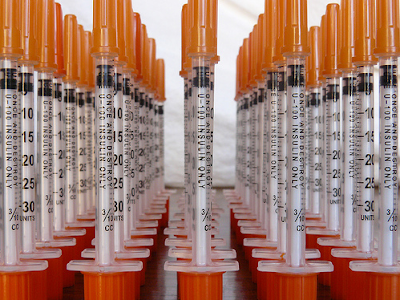2. You are more than 40 years old.
3. You are overweight or obese.
4. You lead a sedentary lifestyle.
5. You have had diabetes when you were pregnant.
6. You have impaired glucose tolerance (blood glucose levels that are higher than normal, but not high enough for you to be diagnosed with diabetes).
[If the above does not apply to you, it does not mean you are free from diabetes. Listen to your body and have it checked whenever you notice the warning signs of diabetes.]
You know you may have diabetes when ...
● Your mouth feels dry and you are abnormally thirsty all the time.
● You urinate more than usual even though you drink almost the same amount of water.
● You feel extremely tired most of the time.
● You lose weight suddenly.
● Your wounds take longer to heal.
● You get recurrent infections.
● Your vision starts to blur.
(The onset of type 1 diabetes is usually sudden and marked by the warning signs mentioned above. However, if you develop type 2 diabetes, these signs are usually subtle and often appear gradually. As one in two people who develop diabetes do not have overt symptoms, checking your blood sugar regularly can help you detect diabetes early.)
If you already have diabetes, you can avoid complications by:
Keeping your feet healthy. Check your feet every day for sore spots, cuts or bruises and have them treated immediately. Keeping your eyes healthy. Schedule annual appointments with your eye doctor for complete eye examinations. See your eye doctor whenever you have problems with your vision.
Keeping your heart healthy. Ask your doctor about ways you could lower your risk of developing heart disease. Keeping good control of your blood pressure and cholesterol levels is a good way to start.
Keeping your kidneys healthy. Talk to your doctor to get your urine checked for protein and blood tested for creatinine every year. These tests will tell you how well your kidneys are working.
(When you have diabetes, a good control of your blood glucose levels is important to prevent and delay problems in your nerves, eyes, blood vessels and kidneys. So, take your medicines as directed, control your sugar intake, and don’t smoke – it raises your risk of developing diabetes problems.)
Diabetes and its complications can be delayed or prevented. Start by:
Adopting a healthy lifestyle. Eat healthily, rest adequately, and exercise regularly. 30 minutes of exercise a day can reduce your chances of developing type 2 diabetes by 40%.
Maintaining a healthy weight. Find out from your healthcare provider how much you should weigh to stay healthy and work out achievable ways to reach your goal.
Going for regular health checks. Regular medical check-ups by your healthcare provider are important as they can help you pick up health problems like early.
Sources: Ministry of Health, Malaysia,- International Diabetes Federation (IDF)- US National Diabetes Information Clearing House (NDIC)












No comments:
Post a Comment